Wisdom Tooth Extraction – Dallas, TX
Preserve Your Oral Health by Removing Troublesome Teeth
Do you know if you have wisdom teeth that need to be removed because they pose a risk to your oral health? Our team at Dental Center of Lakewood has decades of combined experience, and we utilize the latest technology, like our digital X-ray imaging system, to find out whether your third molars could cause problems down the road. If you aren’t sure whether you have wisdom teeth or you’re experiencing pain in the back of your mouth, contact our office today to schedule a consultation with Drs. Spillman or Green!
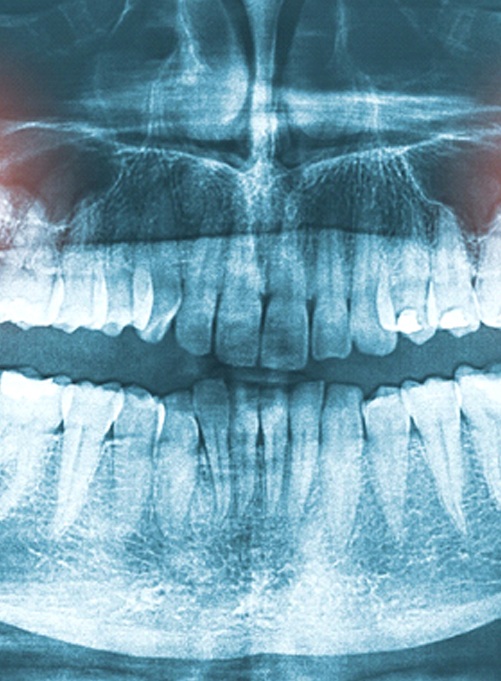
Why Choose Dental Center of Lakewood for Wisdom Tooth Extraction?
- Surgical & Simple Wisdom Tooth Extractions
- In-Network with Delta Dental
- Dentists with Several Decades of Experience
What are Wisdom Teeth?
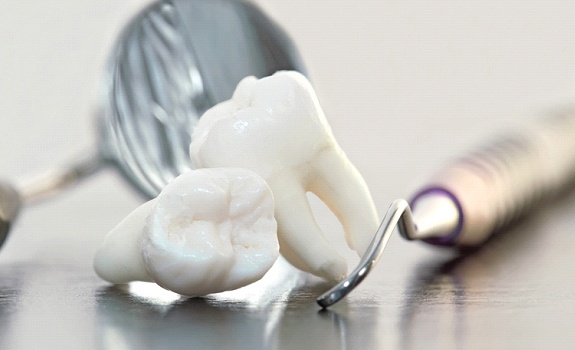
Wisdom teeth, also commonly referred to as third molars, typically grow in between the ages of 16 and 21. While many people have all four of their wisdom teeth, it’s not uncommon for people to have one, two, or only three of them—some even have none! They’re the last teeth to grow in the mouth, and while for our Paleolithic ancestors these were crucial for chewing and digesting raw meats and hard roots and nuts, today, they don’t serve much of a purpose. In fact, many people have them extracted because they could result in oral health problems down the road.
Why Do Wisdom Teeth Need to Be Removed?

Not all wisdom teeth need to be removed, but it’s typically recommended to preserve the health of your existing teeth. Here are some situations in which we may recommend removing your third molars:
- They’re impacted below the gumline
- They’re causing pain and discomfort
- They could cause an infection to form
- There’s not enough room in the mouth for them, so allowing them to grow in could lead to misalignment
What to Expect During a Wisdom Tooth Extraction
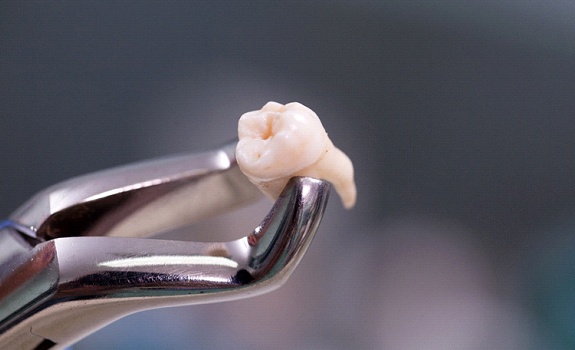
Your wisdom tooth extraction in Dallas will depend on the position of your third molars. If they’re located above the gumline, you will likely need a simple extraction. However, if they’re below the gumline, or impacted, you will require a surgical extraction.
During a simple extraction, we’ll use a pair of forceps, which are similar in design to a pair of tongs you might use in your kitchen, to gently grab the visible tooth structure and wiggle it free from the connective tissue and remove it. For surgical extractions, we’ll need to make a small incision in the gums to gain access to the impacted wisdom teeth in order to remove them.
Wisdom Tooth Extraction Aftercare

After your wisdom tooth extraction, your dentist in Dallas will provide you with thorough post-operative instructions to keep the site clean and reduce your risk of developing dry socket. Here are some directions we typically provide our patients with:
- Don’t spit or drink through a straw
- Maintain a soft diet
- Don’t smoke or chew tobacco
- Don’t exercise or engage in strenuous activity for the first few days
- Don’t rinse your mouth for at least 24 hours, then gently rinse with warm salt water regularly
- Don’t brush the extraction site
If you have any questions or concerns following your procedure, don’t hesitate to reach out to our team!
Understanding the Cost of Wisdom Tooth Extractions

Now that you know more about why you might require a wisdom tooth extraction and how they work, it’s natural to wonder how much they cost. You might not pay the same exact amount as someone else because the pricing depends on your unique circumstances. Once you’ve had a consultation with one of our Dental Center of Lakewood providers, we’ll be able to share more detailed information about what you can expect.
Continue reading to learn more about how the amount due is calculated, and feel free to contact us with additional questions.
Factors That Can Impact the Cost of Wisdom Tooth Extractions
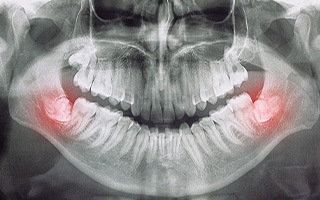
Several different considerations must be taken into account when determining the cost of your wisdom tooth extraction, such as:
- How many teeth require removal? Most of the population has all four wisdom teeth, but some only have a few while others are born with none at all!
- Whether they’re impacted. If your latest molars are trapped in your gums or infected, you’ll likely require a surgical extraction, involving additional expenditures that increase your total.
- The types of anesthesia used. Our team will apply a local anesthetic for a simple extraction, which is less expensive than administering sedatives for a surgical extraction.
- The kind of specialist performing your procedure. If your case is severe, you might require an outside specialist to assist which is usually more costly.
Does Dental Insurance Cover Wisdom Tooth Extractions?

Many dental insurance policies cover at least a portion of the cost of wisdom tooth extractions, but not all plans include benefits for dental surgeries. It’s a good idea to check your details to gain a better understanding of what’s available to you.
There might be other restrictions you must meet before coverage kicks in, too, like a waiting period that must pass or a deductible dollar amount that must be met. If you’re struggling to find the information, don’t hesitate to let us know. Our office staff is familiar with various policies and is happy to help you with paperwork or claims to maximize your benefits.
How to Make Wisdom Tooth Extractions Affordable

If your dental insurance covers your procedure, the best way to save on expenditures is to find a dentist who’s in-network with your insurance provider. Our Dental Center of Lakewood team proudly accepts many popular insurance plans, though we also happily welcome patients with out-of-network benefits.
However, we understand that not everyone has a dental plan and don’t want your budget to keep you from receiving smile-saving procedures that are needed to preserve your oral health. As a result, we’ve partnered with CareCredit to offer low-to-no-interest flexible financing plans. If your application is approved, you can break up your total invoice into more manageable monthly installments.
Wisdom Tooth Extractions FAQs
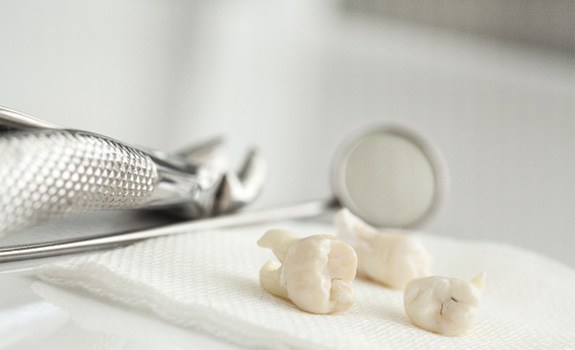
Do you need to have your wisdom teeth extracted? This is a very common procedure, but it’s understandable that you have some questions, so we’re here to help. Here are the answers to some of the most common questions we receive about wisdom tooth extractions in Dallas. If you don’t see the information that you’ve been looking for below, don’t worry. Give us a call and we’d be happy to walk you through the treatment process so you know what you can expect.
Why Do We Have Wisdom Teeth?
Today, wisdom teeth seem to cause nothing but trouble, but they were actually beneficial for our early human ancestors. Early humans ate a diet that consisted of raw foods, including raw meat, berries, nuts, roots, and leaves. They didn’t cut up or cook their food either. Chewing these tough foods requires a broader jaw and strong molars. Since their jaws were larger, the wisdom teeth rarely caused problems when erupting. In modern times, our food is much easier to eat because we prepare it by cooking, baking, and cutting. Ultimately, our wisdom teeth aren’t usually necessary anymore. Since most people’s jaws aren’t wide enough to accommodate wisdom teeth, they often cause more harm than good.
Is Wisdom Tooth Removal Painful?
The first step of wisdom tooth removal is numbing your mouth with a local anesthetic. You will also most likely be sedated, which limits your body’s ability to register pain. Ultimately, you can expect your procedure to be entirely painless. After your procedure, some soreness and discomfort are to be expected, but as long as you closely follow the aftercare instructions provided to you, you should feel back to normal in about a week.
How Long Does Wisdom Tooth Surgery Take?
If you are being sedated, it will feel as if barely any time has passed. On average, it takes about 15-20 minutes to extract a wisdom tooth, so removing all four can take up to 90 minutes. The time it takes varies depending on the tooth’s location, position, whether it’s impacted, and several other factors. Before your procedure, your dentist can give you a more precise estimate of how long your procedure will take so you can plan accordingly.
How Did Wisdom Teeth Get Their Name?
Because of how problematic they can be, wisdom teeth don’t seem very “wise” at all. The theory is that since these teeth don’t emerge until early adulthood, a person is older than they were when the rest of their teeth erupted. It was believed that with age comes wisdom, hence the name of these teeth.
